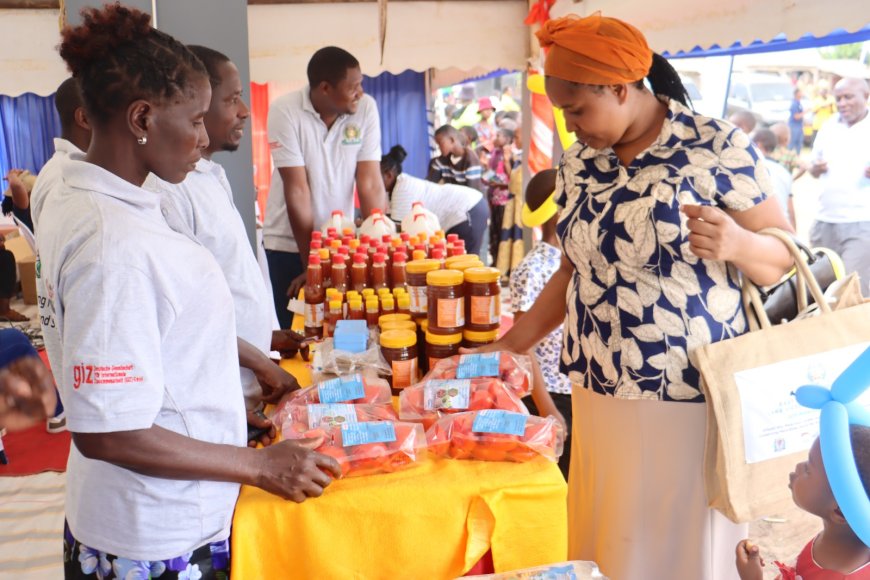Farmers reap big from climate adaptation project

KISUMU
Tuesday, September 19, 2023
KNA By Chris Mahandara
Thousands of farmers within the East African Region are now reaping the fruits of bumper harvests courtesy of the support provided by the Adapting to Climate Change in Lake Victoria Basin (ACC-LVB) project.
ACC project is an East Africa Community (EAC) regional project coordinated by Lake Victoria Basin Commission (LVBC) and is implemented in the Republic of Kenya, Republic of Uganda, Republic of Burundi, Republic of Rwanda and the United Republic of Tanzania.
The pilot project is funded to a tune of USD 5 Million by Adaptation fund through UNEP.
Each country received USD 520,000 for various projects which include micro irrigation system, construction of green houses, and rehabilitation of bore holes to support supplementary micro irrigation.
In Kenya the project is implemented in Siaya and Busia counties while in Uganda the project is implemented in Masaka and Mubende districts.
In Tanzania, it’s implemented in Magu District, Mwanza region while in Rwanda it is implemented in Kirehe District.
In Busia the project has funded the drilling of two bore holes in Osipata Primary and Bukiri Secondary schools.
In Siaya one bore hole has been drilled in Kahoya primary school.
The project has also funded various groups through community adaptation programmes.
The grant helped the groups to venture into horticulture and fish cage farming.
Emilly Odera Chairperson of Weseso group said, “we are happy that this project changed our lives unlike in the past where we relied on rain fed Agriculture we now have bore holes and we easily get water”.
In Tanzania, farmers are now basking in glory after the ACC-LVB Project drilled boreholes that are fitted with solar powered water pumping systems to support micro-irrigation for rice intensification and off-season crop farming during dry seasons.
This has enabled farmers in the area to produce and harvest food crops all year round thus increasing food security in the far-flung area that is prone to frequent drought episodes.
Previously some of the farmers used diesel powered water pumps to do farming.
But since the inception of the project, the farmers have now adopted new methods, using water from the drilled solar powered boreholes.
“Without this project we would have been at the riverbanks farming using diesel pumps, we are very grateful for the project as we have really benefited a lot financially from the sale of the farm products.” Said Mr Jared Paulo, chairperson Kikundi cha Badilikeni in Magu district in Tanzania.
The farmers now plant tomatoes, green gram, Cabbages, Cucumber, Cupsicum, kales, maize, chick peas, sunflower and rice.
Grace Chombo, another member of Kikundi cha Badilikeni group said “we now farm twice a year unlike before where we only farmed during the rainy season. During that time, the production was not good due to unreliable rainfall.”
According to Lake Victoria Basin Commission Executive Secretary Dr. Masinde Bwire, over 2 million people have benefited from the project within the EAC region
“This project has really changed the face of the villages, if you look around you can see the neighbouring areas are very dry with no farming activities going on, but in the villages where the project is implemented, life is different, and the farms are green,” Dr Bwire said.
The ACC-LVB project has also supported the communities in Nghaya village, Magu district in the United Republic of Tanzania by installing three greenhouse technologies to promote vegetable and horticultural productions.
One has been built at Ng’haya Secondary School, and two at Kikundi cha Mboga Mboga community group as a learning centre on greenhouse farming.
Madam Glory Sulungu, Head Mistress of the institution said, “We acknowledge the benefit of greenhouse technology and are glad that we have received training on modern farming methods and both teachers and students have now realized that apart from rain fed agriculture, there are also other methods of farming.”
In the Promotion of Ecosystem based adaptation interventions, tree nursery has been established at Busalanga Primary and Ng’haya Secondary schools and 400 different fruit tree varieties planted at the same institution.
In addition to crop farming, the project has also supported two community groups with 149 beehives to practice bee farming.
So far, they have been able to harvest over 400 litres of honey.
The project has also installed a demo rainwater harvesting system at Ng’haya secondary School with four water tanks of 5000 Litres for learning and encouraging communities around to practice rainwater harvesting as an adaptation technology.
Courtesy; KNA
What's Your Reaction?































































































































































































































































































